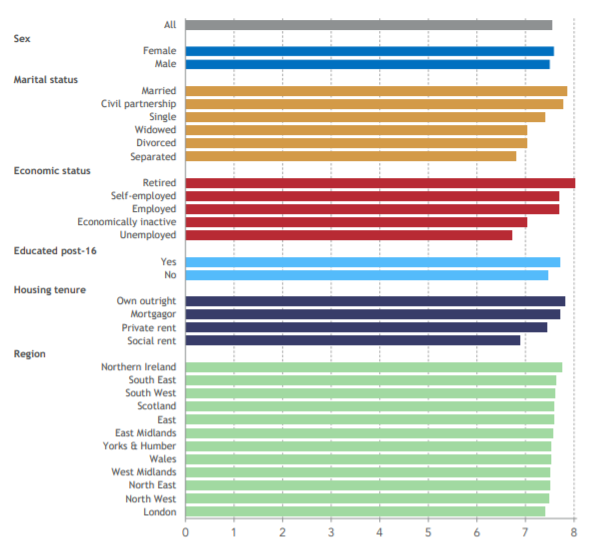As the Bank of England warns of a possible “economic shock” from a no-deal Brexit, many are predicting a gloomy future for the UK, but are things really that bad? And is this uncertainty impacting upon British personal and economic well-being?
Economic well-being wobbles: uncertainty hits GDP and investment
In the final quarter of 2018 the growth of Britain’s gross domestic product slowed to 0.2% taking the annual GDP growth down to 1.4%, the lowest rate since 2012.
In their latest UK GDP monthly estimate, the Office of National Statistics (ONS) say this is due in part to a decline in manufacturing of cars and steel products. Although services within the health, management consultancy, and IT sectors continued to grow.
Many economists also believe that heightened fears of a no-deal Brexit mean business projects are being put on hold, causing the largest business investment slump since the financial crash.
More jobs more worries
With the lowest unemployment levels since 1975, the UK labour market is getting tighter. Leaving more open vacancies with fewer qualified people able to fill them.
And while the average earnings have improved, it has come at the cost of job quality and security. Growing numbers of workers are being edged into flexible roles with non-guaranteed hours, and evermore families are increasingly concerned about their finances.
As the ONS Head of Inequalities, Glenn Everett, states:
“Despite high levels of employment, rising incomes and spending across UK households, people are not reporting increases in their well-being. This may be due to worries about rising debt repayments, which could be driving concerns about their future financial situation.”
Will a weaker pound weigh us down?
After the Brexit vote the value of the pound plummeted against the dollar and euro. But while ground has been recovered the fears of a messy EU divorce mean its value is seen at risk once again.
A weak pound is potentially good news for British exporters as products become more competitive in foreign markets. The caveat being that the UK is a mostly import-driven economy running a big trade deficit, as the latest ONS trade statistics show.
Sadly, for most UK citizens a weak pound is bad news. As nearly a quarter of all our food produce comes from the EU, meaning life in the UK could get a lot more expensive. And rising food costs would hit the poorest hardest, pushing more into poverty.
Has Brexit affected Britain’s happiness and well-being?
Recent UK poll results on Brexit have been unsurprising: 69 percent of Britons declared that Brexit was ‘going badly’. So, with the country hitting uncertain times you’d expect the mood of citizens to be pretty glum? Interestingly, the ONS say Brits have been getting gradually happier, at least until very recently. Happiness, life satisfaction and the feeling worthwhile were up between June 2016 and June 2018 and started stalling in September 2018.
On average, Brits rated their personal happiness at least a seven-and-a-half out of ten for each.
So, what’s making Brits happy?
Lots of things, according to the “Happy now?” report from Resolution Foundation.

Average level of life satisfaction UK, 2011-18
*Source Resolution Foundation , RF Analysis of ONS Annual Population Survey, pooled data for 2011-12 to 2017-18
Fundamentally, the report suggests that your chances of well-being, are truly improved the more secure your lifestyle is, especially when it comes to your health, housing and income.
Based on the results, house owners, teenagers, pensioners and people in long-term relationships have all declared substantially higher well-being, happiness and satisfaction in life.
Brexit blues
If Brexit really does collapse into a messy affair, then it seems unarguable that the UK’s economic well-being could take a hit. How deep the impact, and for how long it resonates is impossible to forecast.
In either case, if just a fraction of the business investment currently on hold is then terminated, or the flow of trade and daily goods are interrupted, the finances of millions of households and businesses could be in jeopardy. And job security, mortgage and rent payment, and the repaying of debts would come under intense scrutiny.
As the health, happiness and well-being of the UK and its people are intertwined, they both need long-term security to grow and prosper, and short-term health for happiness.
________________________________________
At a time of uncertainty and stress, having a professional assurance that your financial difficulties can be handled effectively, with empathy and confidentially, is crucial.
If you think that you may need help with resolving your personal or business financial worries, do not hesitate to contact us.
You don’t know what we can do until you ask.
